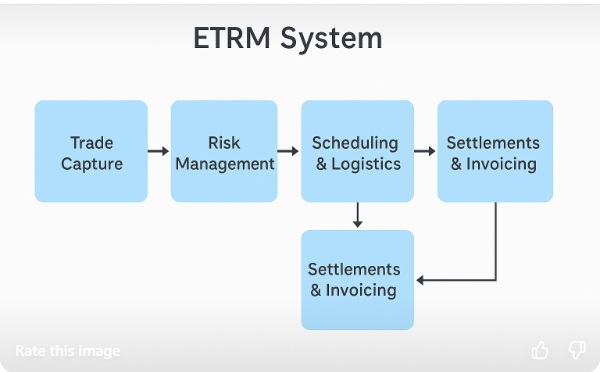from strategy to implementation
one stop solution
ETRM
An ETRM system stands for Energy Trading and Risk Management system. It's a specialized software platform used by energy companies (like utilities, traders, oil & gas firms, etc.) to manage the trading, risk, logistics, and settlement of energy commodities.
ETRM is Energy, Trading, Risk Management framework.
An ETRM system supports the end-to-end lifecycle of energy transactions, including:
1. Trade Capture
• Logging energy trades (power, gas, oil, emissions, renewables, etc.)
• Captures deal details like price, quantity, delivery period, counterparty
2. Risk Management
• Measures exposure to market risk, credit risk, and operational risk
• Calculates VaR, Mark-to-Market (MtM), P&L, Greeks, and stress tests
3. Scheduling & Logistics
• Manages physical delivery and nominations (e.g., gas pipeline flows or electricity schedules)
• Supports integration with TSOs (Transmission System Operators) and market operators
4. Settlements & Invoicing
• Automates invoicing and reconciliation
• Calculates financial settlements, taxes, penalties, etc.
5. Reporting & Compliance
• Supports regulatory compliance (e.g., REMIT, MiFID II)
• Generates audit trails and internal reporting
ETRM manages the following Commodities
• Electricity (day-ahead, intraday, forward)
• Natural gas
• Crude oil & refined products
• LNG (liquefied natural gas)
• Coal
• Emissions (carbon credits)
• Renewable energy certificates
Some widely used ETRM platforms include:
• Allegro
• Endur (by Openlink/ION)
• Trayport
• AspectCTRM
• Igloo (by Brady)
• EnHelix
Key business case for ETRM is the complexity of energy markets
The energy market is volatile and highly regulated. ETRM systems help:
• Manage complex pricing structures (hourly, location-based, seasonal)
• Handle both physical and financial energy products
• Mitigate risks due to price spikes, counterparty defaults, or delivery failures
A general framework of ETRM

Primarily a comprehensive solution for an ETRM captures the major components in the life cycle of energy trading: 1. Trade Capture – where deals are logged 2. Risk Management – where exposures and risks are calculated 3. Scheduling & Logistics – handles physical flows 4. Settlements & Invoicing – processes financial outcomes 5. Reporting & Compliance – for internal and regulatory reporting Each module connects sequentially to form a full-circle solution, supporting everything from trade execution to final settlement and compliance.
There are multiple uses cases that will be explored elsewhere in this website
Quick Links
Menu

a one stop shop for trading and risk

“rewards are bestowed upon those who endear risk” .. sr
Contact
- 100 Church Street. Lower Manhattan, NY 10007
- 6220 Westpark Drive Suite 149, Houston, TX, 77057
- +17138519402
- +12815792210
- info@ramsrisk.com